Six of the best alternatives to Twitter

Elon Musk's takeover of Twitter has polarized opinion, there are those who think he's a champion of free speech, and those who think it marks the beginning of the end for the blue bird.
But while Twitter was a unique concept when it launched back in 2006 there is now no shortage of other microblogging platforms that operate in a similar way, allowing you to post messages, pick up followers, get into virtual fights, etc.
At the moment there seem to be lots of people on Twitter (which has a user base of over 230 million) saying they're going to ditch the platform but not actually going anywhere. But for those who've decided they really, really do want to abandon Twitter and look for an alternative, here's our quick guide to some of the choices available.
SEE ALSO:
- Is this the right time to look for a job in crypto? [Q&A]
- Metaverse? Meh!
- What popular culture gets wrong about hacking [Q&A]
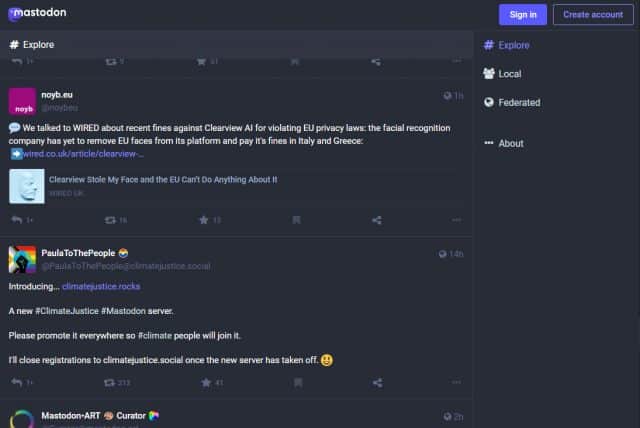
In the past few days Mastodon has been looking like one of the prime pretenders to Twitter's crown, not least because Musk has been tweeting about Mastodon's technical failures caused by an influx of new users.
The key feature of Mastodon is that it's decentralized, when you join you sign up to a server -- there are lots of them -- and then gain access to the platform through that. If one server goes down the rest of the network continues to operate, though that's no consolation if it happens to be the one you're signed up to that's failed.
Also each server has its own policies about what you can and can't post which makes choosing which one to use a bit of a nightmare. However, it is open source which means you can always set up your own server if you decide you don't like any of the others.
The overall concept is good but it might prove daunting for the average social media user.
Registered users: 4.5 million
Verdict: Good concept but not well executed.
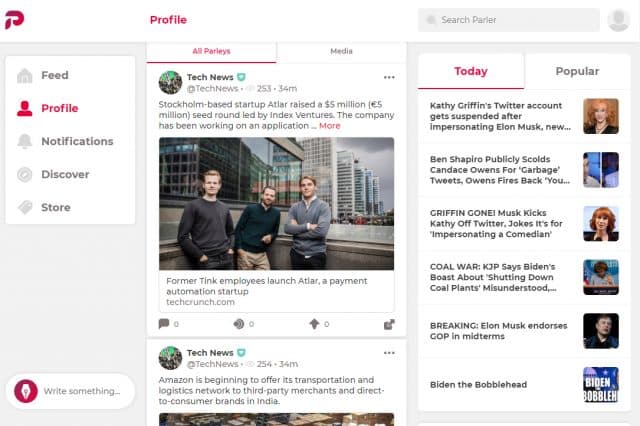
There was a point -- round about the time when Twitter was busy banning Donald Trump -- that Parler, billed as a free speech platform, looked as if it might offer a serious challenge. That is until big tech, in the form of AWS, decided it didn't like the kind of free speech Parler was offering and kicked the platform off its servers.
Since then Parler has rebuilt and relaunched with different hosting though it still leans to the right politically. In October 2022, Parler was bought by controversial rapper Kanye West (the artist now known as 'Ye') who is just as divisive a figure as Musk and has actually been censored by his own platform for using offensive language.
The site has a nice look with quick and simple account creation and there's a slick mobile app too. It works in pretty much the same way as Twitter and you'll find some major media outlets posting on there.
Registered users: 20 million
Verdict: Twitter-like look and feel, different controversial owner.
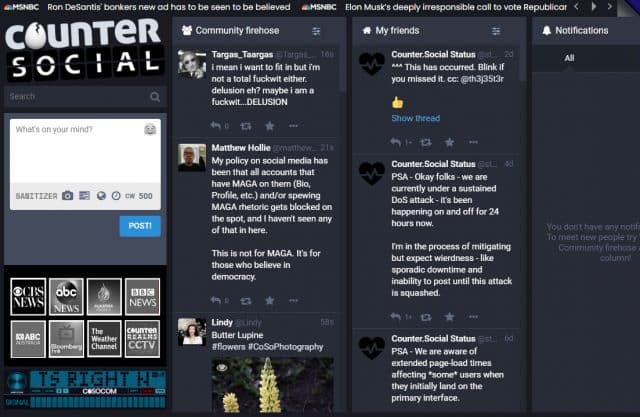
If you've ever used TweetDeck you'll feel right at home on CounterSocial. There's also a virtual reality element allowing the creation of 'Realms' where you can communicate via an avatar -- Metaverse, anyone?
CounterSocial doesn't have a public browsing feature so you have to register in order to sample its content. There are a number of in-built safety features like bot and deepfake detection, along with identity theft alerts and color-coding to rate the reliability of news sources. There's a 500 character limit on posts so you can be a bit more expansive than on Twitter which only allows 280.
Paid upgrades to a Pro account are available, this gives you access to extra features like being able to create posts that automatically expire after a set time, or post files securely.
Registered users: Unknown
Verdict: Good for news and current affairs, impressive safety features.
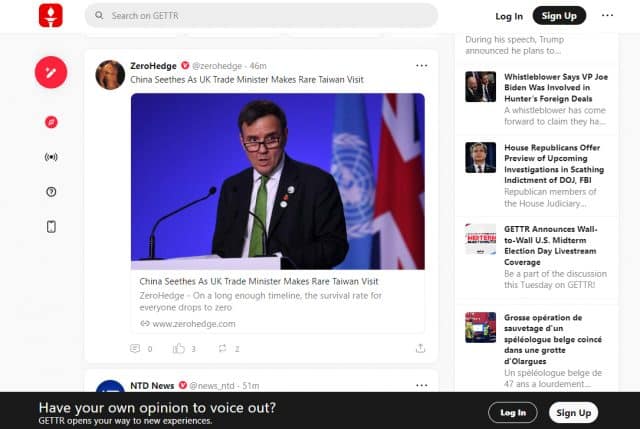
GETTR styles itself as a 'marketplace of ideas' and was founded by a former Trump aide, so as you might guess it has a conservative slant -- though rather less so than Gab. It's also currently quite US-centric and the content is politics-heavy so it's less likely to appeal to those in other countries.
The web interface is similar to Twitter's, allowing you to re-post, like, share and reply. You can explore the site to see what's on there without having to create an account. There are apps available for iOS and Android as well as the web interface and the registration process is straightforward, you can even sign up with your Twitter account.
Registered users: 4.5 million
Verdict: Well designed and easy to use, limited content for non-US users.
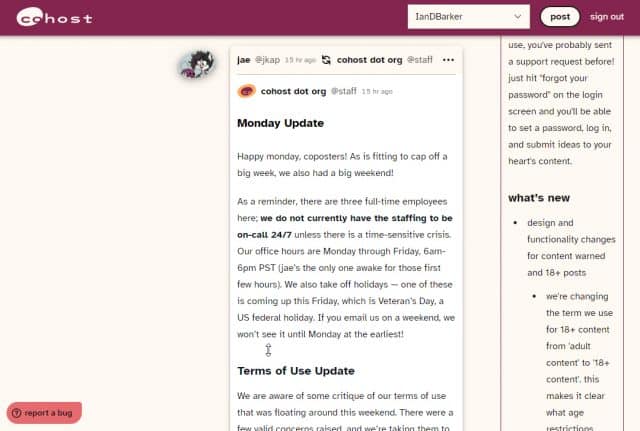
Cohost is rather more like Tumblr than Twitter, its selling point though is that it is advert free and promises that it won't "…sell your data, sell ads, or sell the company to anyone who might change these policies to make a quick buck." The downside of this is a lengthy sign up process which means new users can browse the site but are unable to post until their account has been verified.
Basic access is free or you can pay for a subscription which gives you more customization options and the ability to upload larger files.
There is currently no mobile app so you have to use it through the web though the interface is pleasingly uncluttered and simple to use.
Registered users: Unknown
Verdict: Still in its early stages, worth watching.
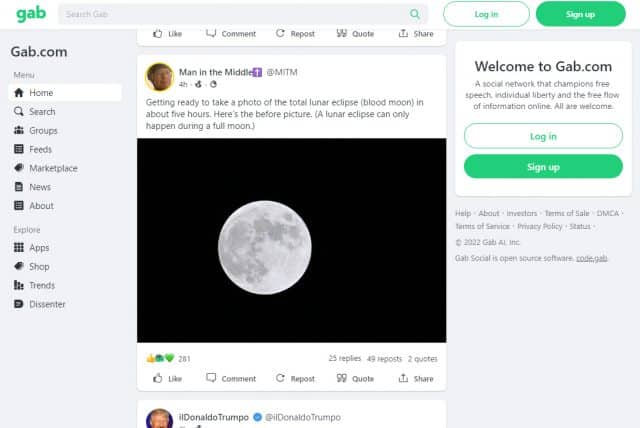
Like Mastodon, Gab is decentralized and so not at the mercy of big tech cloud hosting. Gab's CEO Andrew Torba describes it as an alternative to "the entirely left-leaning Big Social monopoly". You won't be surprised to learn then that its app has been banned from both the App Store and the Play Store and it's sometimes described as being 'alt-right'.
That's a shame really because the site itself has plenty to commend it. Were it not for the color scheme you could easily believe that you were on Twitter, even down to the blue ticks for verified users. Among familiar features there are groups targeting particular interests and a marketplace where you can buy and sell stuff. Content is very politics-heavy though.
Registered users: 4 million
Verdict: I can't believe it’s not Twitter, shame about the politics.
Image credit: InkDropCreative/depositphotos.com
